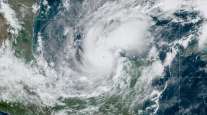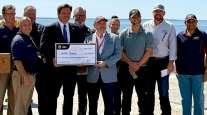Port Everglades to Explore Export Opportunities With Cuba

Port Everglades plans to sign an agreement with Cuba designed to generate job opportunities locally and revenue for both the port and its Caribbean counterpart, according to a letter by Port Director Steven Cernak inviting business leaders to the signing on Jan. 26.
A delegation of Cuban government officials who are directly involved in promoting trade and investment will travel to Port Everglades for the invitation-only event.
Royal Caribbean Cruises, Carnival Corp., Stonegate Bank of Pompano Beach and other South Florida companies are on the invitation list, said Glenn Wiltshire, deputy director of Port Everglades. Cuban officials will include those from the Port of Mariel's special development zone, inland waterway and seaport.
The Port of Mariel, which opened in 2014, is a centerpiece of Cuba's trade and economic development ambitions. Located west of Havana on Cuba's north coast, it has the capacity to receive large containerships that pass through the widened Panama Canal. Port Everglades has similar expectations, as well as its own goals to deepen its navigational channels and widen its entrance channel.
The meeting with the Cubans is an exploratory one that was begun before American policies toward Cuba began to change, Wiltshire said. The relationship will be "similar to what we have with sister seaports, where we look for opportunities to grow business that is mutually beneficial," he said.
A memorandum of understanding "will put on paper general areas to cooperate with them, all still within the framework of the [trade] restrictions," he added.
Despite a series of Obama administration executive orders that allow broader American business contacts with Cuba, the U.S. trade embargo against the communist island remains in force. It can be lifted only by an act of Congress.
Wiltshire said Port Everglades expects primarily more cruise and export opportunities for local cruise lines and business owners. He said Port Everglades is one of several U.S. ports that the Cuban delegation has on its itinerary.
On Jan. 17, the 210-passenger Pearl Mist left Port Everglades for its maiden voyage to Cuba. The ship operator, Pearl Seas Cruises of Connecticut, received permission from the Cuban government in December for its 10-night cultural voyages to the island.
Another example is Crowley Maritime Corp.'s twice-weekly cargo service from Port Everglades to the Port of Mariel. That potentially could be expanded, Wiltshire said.
Products that might be exported to Cuba include poultry, produce, equipment and building materials, according to Port Everglades officials.
But South Florida economist J. Antonio Villamil said the timing for the meeting — just days after President-elect Donald Trump's inauguration as president — may not be the best.
"This is not the time to be talking about trade and investment opportunities when things could become much more restrictive under the Trump administration," Villamil said. He noted that Trump's nominee for secretary of state, Rex Tillerson, has told Congress that executive orders signed by outgoing President Obama — including those liberalizing commercial contacts with Cuba — will be reviewed.
Obama and Cuban President Raul Castro announced the re-establishment of diplomatic relations between the two nations in 2014, and both countries reopened their respective embassies. In February 2016, a bilateral arrangement restored scheduled air services between the United States and Cuba.
Last May, the cruise ship Adonia made history, leaving from Miami to become the first U.S. ship in decades to dock in Cuba. In August, JetBlue Airways became the first airline to begin commercial flights between the United States and Cuba in several decades, leaving from Fort Lauderdale-Hollywood International Airport and arriving at Santa Clara, Cuba.
Since then, a number of U.S.-based airlines have commenced flights from South Florida to a variety of Cuban cities.




